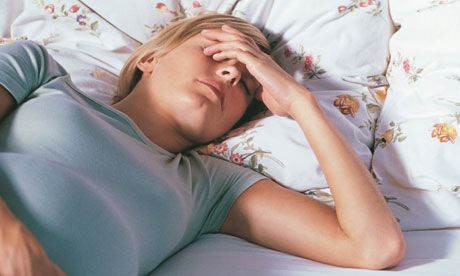
Cheryl Harrison, 34, was nine weeks into a planned second pregnancy when she decided she couldn't continue any more, and had a termination. The reason? Morning sickness so severe it made her vomit more than 25 times a day, and left her unable to care for her toddler.
Harrison said the abortion was "the most horrendous decision I have ever made". But she simply couldn't cope, she told a newspaper last week. "I was vomiting morning, noon and night . . . I had one day where I could not move from the bathroom. I couldn't get Scarlett [her toddler] anything to eat even though she was starving. I dragged myself across the floor, managed to get her some chocolate from the fridge and thought, 'I can't do this again.' "
For women like Harrison the term "morning sickness" is an ironic misnomer, as delegates to Britain's first-ever conference on the subject will hear this week at Warwick University. Dr Brian Swallow, one of the organisers, became interested in pregnancy sickness after his wife Valerie suffered from it severely during both her pregnancies. "She couldn't get out of bed, she was in and out of hospital, she was nauseous and vomiting all day," he says. "At one stage, in her second pregnancy, my little boy even asked me whether his mummy was going to die.
"It's a really serious, debilitating condition – but many people don't understand that. You even get employers who think women are exaggerating its severity so they can have time off work," says Swallow.
Dr Tony Barnie-Adshead, a retired GP who has been researching the condition for 40 years, agrees. "It's not just a morning problem – for a lot of women it's a morning, noon and night problem," he says. "Calling it morning sickness has totally trivialised what can be a very serious health risk."
Around seven in 10 pregnant women have episodes of nausea during pregnancy; but a smaller number, around one in 50, suffers the kind of extreme sickness, or "hyperemesis gravidarum", experienced by Harrison. And for one in 100, the symptoms are bad enough to require hospital treatment, usually because they've become so dehydrated that they need intravenous fluids.
Before the arrival of drips, in the 1950s, women even died of it," says Barnie-Adshead. Charlotte Brontë, who died in 1855 in the early stages of pregnancy, is believed to be one of its highest-profile victims – in the weeks before her death, she complained that all food made her feel sick, and couldn't keep anything down.
Yet despite its potential seriousness, many women feel their symptoms aren't taken seriously enough by the medical establishment. The problem, says Swallow, is that there is no clearly defined way of dealing with it medically. "In this country, unlike for example in Canada, where it's taken seriously and treated properly, there's no treatment protocol, which means there's no uniformity of how you'll be treated if you go to your GP with pregnancy sickness. Some doctors may be very good at knowing how to help – but for too many women, the response of their GP will be that it's just something you have to put up with."
The cause of pregnancy sickness isn't clear. "It's not psychological," says Swallow. "It's biological. We know it's hormonally-linked, but we're unsure whether the sickness affects the hormones, or whether the hormones cause the sickness. One theory is that evolution has preprogrammed pregnant women to reject food because it could contain substances that are harmful to the embryo. In early pregnancy, when sickness is more common, you don't need a lot of extra calories, so going off food because you're feeling sick could be a protective mechanism." And there's a new theory, which will be discussed at the conference, that pregnancy sickness is linked to protein deficiency.
In the UK there is no drug licensed for use. But in fact, says Dr Barnie-Adhead, there are treatments around that could help deal with it – if only the medical will was there to licence them. Also, he says that if more women with pregnancy sickness were treated early on, sometimes with drugs, they would not have to spend such an important time in their lives in hospital.
How to survive morning sickness
▶ Keep a diary of when you feel sick, when you actually are sick, when you're fine etc. "A pattern will emerge, and you'll realise there are times in the day when you don't feel as bad," says Dr Barnie-Adshead. "And the important thing is to be ready for those windows, so you can eat and drink when you are able to. Keeping your fluid levels up is extremely important – dehydration is the main reason for hospital admission." ▶ Eat cold foods. "Odours are the hardest thing to deal with for women with pregnancy sickness, and they often trigger nausea," says Barnie-Adshead. "Cold food tends to be much less odorous than hot food, and that can make all the difference when it comes to whether you can manage to eat it and keep it down or not."
▶ Talk to your doctor about being prescribed an antihistamine and Vitamin B6. Both have been shown to reduce pregnancy nausea. GPs are often resistant to this because they fear antihistamines could be harmful to foetuses; however, the support group Pregnancy Sickness Support maintains that H1 receptor antagonist antihistamines are not dangerous, and recommend Promethazine (Avomine) and Cyclizine (Valoid). However, it is not recommended that you take these drugs without prescription.
▶ Try eating ginger, which has proved useful for some women, and buy a "sea band" – pressure on the P6 point, three fingers breadth above the wrist, has been used to combat other sorts of nausea, eg travel sickness, and trials have found it useful for pregnancy sickness too.
For more information see pregnancysicknesssupport.co.uk

